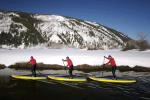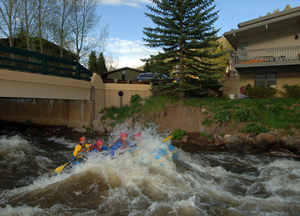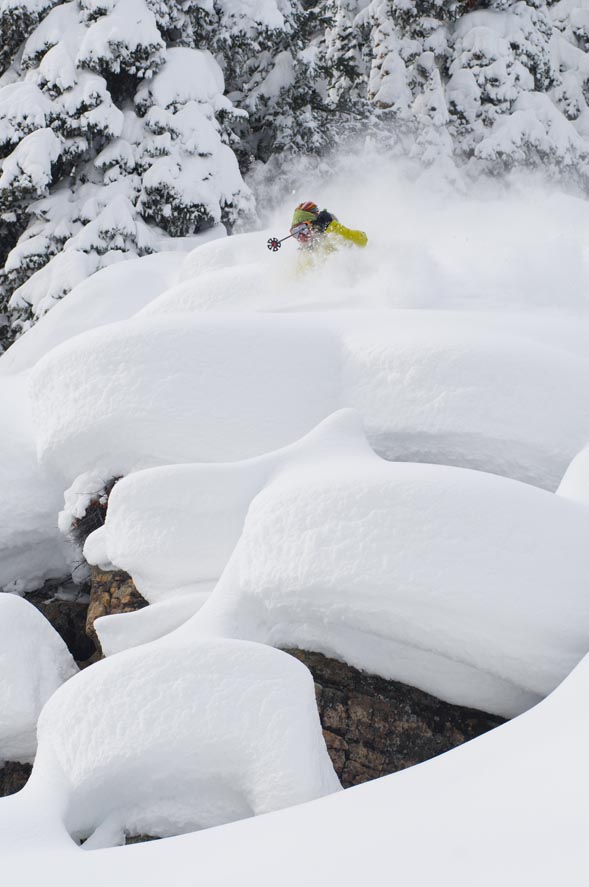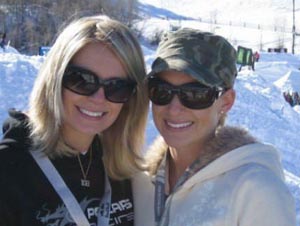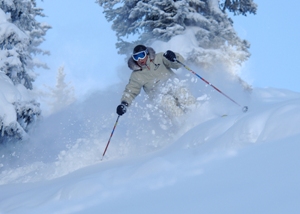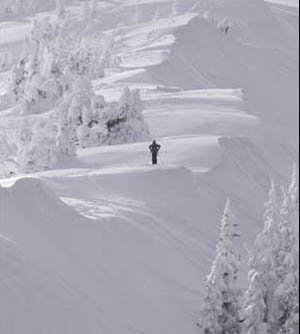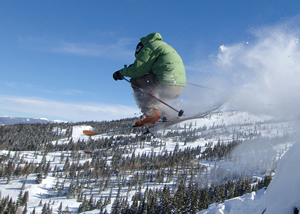
By Dan Davis www.trekkerphoto.com
- Coming soon to a rest area near you: Yellowcake uranium, a low-risk form of hazmat
- Garfield County continues to debate resolution on DeGette's FRAC Act
- Can uranium mining, tourism and outdoor recreation coexist in Montrose County?
- Telluride residents rally against proposed uranium mill in Montrose County
- Heavy hitters Udall, Denver Water, USFS get behind Vail biomass power plant concept
- Natural gas drilling to keep moving closer to nuclear blast site near Rulison
- School of Mines professor says gas industry tried to get him fired for controversial comments
- Vail Valley Medical CEO Cassin resigns
- Polar exploration company Quark Expeditions signs on as major sponsor of Vail Valley Foundation
- Shaw Cancer Center in Edwards unveils new PET/CT scanner
- All Real Biz Articles
November 2, 2008 — The environment, by nature, is the business of Colorado Ski Country USA (CSCUSA). With a combined 28,276 acres of skiable Rocky Mountain terrain, CSCUSA member resorts continue to stay on top of their greatest asset by implementing and improving programs that focus on renewable energy, waste reduction, alternative transportation and environmental partnerships.
More than one third of CSCUSA member resorts offset 100 percent of their energy use through the purchase of renewable energy credits (RECs) and more than half of CSCUSA resorts offset some portion of their energy use through RECs. According to EPA estimates, these combined initiatives translate into approximately 3,607.4 metric tons of carbon dioxide being offset per year, or the equivalent of offsetting 319 average single family homes a year or, 92, 497 tree seedlings grown for 10 years.
The CSCUSA member resorts that are leading the way down this greener path include Arapahoe Basin, Copper Mountain, Crested Butte and Wolf Creek, all of which offset 100 percent of their energy use. Additional resorts such as Powderhorn, Steamboat, Telluride, Winter Park, Aspen Mountain, Aspen Highlands, Buttermilk and Snowmass offset a portion of their operational energy use.
Colorado Ski Country USA member resorts combined have more than a dozen industry recognitions and awards for outstanding environmental leadership. All 22 CSCUSA member resorts recycle and each is doing its part as an environmental steward to implement programs that reduce and offset energy use and help to keep Colorado’s natural beauty unchanged for generations to come.
Arapahoe Basin
For the 2008-09 season, Arapahoe Basin is taking great strides toward environmental sustainability. Arapahoe Basin is one of several CSCUSA member resorts that offset 100 percent of their electrical use (both on mountain and off) through RECs. They are the first smaller ski area to do this.
Recycling is another area where A-Basin excels. The new deck at Black Mountain Lodge is being built with recycled products, and along with placing recycling bins next to every trash can, A-Basin administration offices use vermacomposting bins. Staff are encouraged to compost any unwanted food scraps and after harvesting the worms, the vermacompost (worm manure) is then given away to staff for use in their gardens. Arapahoe Basin also sends their kitchen oils and grease away to be recycled, along with cardboard, bottles and paper waste.
A-Basin uses less water for snowmaking than any other ski area in Colorado. Additionally, their airless snowmaking system uses substantially less electricity than standard equipment.
A-Basin is also paving the way in encouraging alternative public transportation. The Summit Stage bus runs from Breckenridge to Arapahoe Basin, stopping at multiple locations in-between. During the 2007-08 season, A-Basin saw a 50 percent increase in bus passengers. The Summit Stage reports that riding the bus saves 20 pounds of CO2 emissions per day, and with more than 100 people riding the bus per day, the amount of CO2 emissions saved is significant.
A-Basin supports public transportation, so much so, that employees are not only encouraged but are rewarded for using public transport, and so are A-Basin’s guests. Arapahoe Basin offers discounted lift ticket rates to those who carpool to the ski area. The program offers the discount even if people in the car have a season pass.
The positive environmental efforts made by Arapahoe Basin are not overlooked. This year the resort was awarded the 2008 Clif Bar Silver Eagle Award for Visual Impact and has been a finalist in consideration for many other environmental awards.
Aspen/Snowmass
A world class resort in many ways, Aspen/Snowmass, consisting of Snowmass, Aspen Mountain, Aspen Highlands and Buttermilk, is a leader in environmental sustainability and alternative energy. Aspen/Snowmass recently funded ski industry’s largest solar array and the resort has also led the way in exploring hydro and wind energy sources.
Through solar energy, Aspen/Snowmass generates a total of 172.2kW with 147kW coming from a new solar array recently installed at the Colorado Rocky Mountain School (CRMS) in Carbondale, Colo. The $1 million system sits on one half acre of ranchland owned by the high school and is currently the largest solar electric installation in all of ski country.
The electricity generated powers the school’s science building, with excess energy fed into the town of Carbondale’s power grid. Annually, the installation will produce 200,000kWh (enough power for 20 average American homes) and keep 400,000 lbs of carbon dioxide out of the air each year.
Several other facilities around Aspen make use of solar energy including a 2.3kW solar installation at Aspen Highlands that powers the ski patrol shack; Thunder River Lodge, a new employee housing complex in Carbondale, CO, has a 10.6 kW solar installation; The Little Nell hotel has installed a 5kW array with energy monitoring room that will detail consumption and power generated; and the Snowmass Club recently installed a 4.3kW solar array.
Along with solar arrays, Aspen/Snowmass also installed a micro-Hydro plant has been installed at the resort. The 115kW micro-Hydro plant at Snowmass will generate power during the summer when run-off begins. This plant generates nearly enough energy to power 20 average American homes each year, this season, however, due to high water concentration after a winter of great snowpack, the micro-hydro plant actually generated power for two extra months.
More environmental progress at Snowmass is being served up with LEED certified construction of Sam’s Restaurant and Snowmass base village will be certified as LEED for Neighborhood Development (LEED ND).
In 2007, 4.4 million passengers used alternative transportation in Aspen/Snowmass. Aspen’s Roaring Fork Transit Authority (RFTA) operates a number of Hybrid Buses and has increased the percentage of Bio-Diesel used in the buses. RFTA provides extensive commuter bus services within the Roaring Fork Valley between Aspen and Glenwood Springs. Limited commuter bus services are provided between Glenwood Springs and Rifle.
Intra city bus services are available within Aspen and Glenwood Springs through contracts with these municipalities, and free skier shuttle services are provided to the four Aspen ski areas under a contract with Aspen Skiing Company. In 2003 and again in 2006, RFTA won the honor of “Large Transit Agency of the Year” by the Colorado Association of Transit Agencies (CASTA).
At Aspen/Snowmass, environmental partnerships go beyond the corporate realm. More than half of Aspen/Snowmass employees contribute a dollar per week to the Environment Foundation, which is a nonprofit governed and run by employees.
Employee contributions are matched by the Aspen Community Foundation, and again by the Aspen Skiing Company Family Fund. Donations go to local environmental causes such as clean air and water programs, trail maintenance and energy efficiency initiatives. The foundation has donated $1.2 million to various groups in the Roaring Fork Valley since its inception in 1997.
Aspen wants to bring energy efficiency to a new level. To do so, Aspen is working to advance state and federal-level policy that reduces climate change threats. In 2006, Aspen Skiing Company was one of three filers of Amicus Brief arguing that the EPA should regulate CO2 from autos under the Clean Air Act – a landmark case where the Supreme Court ultimately agreed with the brief.
Because of their profound leadership in the environmental arena, Aspen/Snowmass is regularly recognized as a company to emulate. Recent accolades include, 2008 Clif Bar Silver Eagle Award for Environmental Education, 2008 Snowmass Club Golf Course Audubon Cooperative Sanctuary Program Certification, 2008 National Ski Areas Association (NSAA) Best Overall Marketing Programming (Resorts with 500,000+ skier visits – recognizing Aspen/Snowmass’ compact fluorescent distribution program), and 2008 City of Aspen ZGreen Membership recognizing exemplary environmental stewardship.
Copper Mountain
While Copper Mountain moves forward on construction of the 19,000 sq.ft. training facility, Woodward at Copper, they are striving for Green Globes recognition of environmentally sustainable building practices. Already a steward of the environment, Copper Mountain offsets 100 percent of electricity used for snowmaking, lifts and all Copper-owned buildings, amounting to 20,000 Kwh.
Additionally, Copper operates three Cobus 3000s, environmentally friendly buses that are nearly 60 percent more efficient than standard buses. Copper has also been able to reduce its snowmobile fuel consumption by 40 percent in the past two years.
Copper’s overall renewable energy strategy is evidenced by the recent installation of their first solar project. Photovoltaic panels now line the south-facing roof of Copper’s Transportation Center located in the Alpine Lot. The 4.2 kilowatt solar system is providing a portion of the electricity for the building.
Increased recycling will continue to be a priority of Copper Mountain, with plans to add several independent businesses to the program and pilot a guest recycling program in The Cirque hotel. Copper will also continue to reuse materials whenever possible in terrain parks and other on-mountain operations.
In support of the benefits of public transportation and carpooling, Copper Mountain is offering carpooling incentives to guests who arrive with four or more people in their vehicle. On select weekends, Copper will be offering premier parking in the Alpine Lot for those who carpool.
Carpoolers will not only enjoy VIP parking close to the shuttle buses and a short walk back to their car at the end of the day, but they will also be entered into a Season Pass giveaway for the 2009-2010 winter season. Additionally, Copper will be further incentivizing guests to carpool by providing fun bumper stickers that take a light-hearted slant on the campaign.
Local forest conservation plays a large role in Copper’s Environmental Program. Copper has partnered with the National Forest Foundation (NFF) to fund local conservation projects and has committed to donate funds to the Friends of the Dillon Ranger District (FDRD), a local non-profit partner of the United States Forest Service (USFS).
Copper will continue to raise funds through the Ski Area Contribution Program, support local conservation groups, including FDRD, and maintain the local Wheeler Lakes Trail through the Adopt-a-Trail program.
The Ski Area Contribution Program granted more than $75,000 to local non-profits since its inception in November 2006. Copper has also created an employee environmental fund, whereby voluntary contributions from employees are matched by Copper and the money is granted to local non-profit or tax-exempt groups conducting youth-focused community environmental projects, through which more than $5,000 was granted to four projects to support local youth environmental action and education initiatives in the first year alone.
As Copper emerges as a major player in environmental stewardship, they look for ways to make a longer lasting impact. Copper Mountain supports state and federal legislation to reduce carbon emissions.
They support the Rocky Mountain Climate Organization’s Colorado Climate Project and Colorado Bill Ritter’s climate action plan to reduce energy and fuel consumption. On a national level, Copper supports the U.S. Climate Action Partnership, which is endorsed by the National Ski Areas Association and the National Resources Defense Council.
Crested Butte
In time for the 2008-09 ski season, Crested Butte Mountain Resort (CBMR) will join the other Colorado resorts to offset their carbon footprint 100 percent with RECs. In addition to alternative energy efforts, Crested Butte participates in resort-wide recycling, green building and donates a percentage of property sales and business sales to preserving open space in the Gunnison Valley.
Guests at restaurants and retail operations at CBMR will have the opportunity to assure open space in the upper Gunnison Valley. Butte 66, Rustica, the Ice Bar, Paradise Warming Hut, Base Area Basics, On Mountain Basics, the General Store, The Woodstone, The Woodstone Deli, The Grand Lodge Gift Shop, the Atmosphere Restaurant, and Elevation Station are all participants in the 1% for Open Space program.
With purchases at these participating locations, customers are given the option to donate 1% of the services provided to them to 1% for Open Space. Once collected, the program grants this money to requesting organizations for the protection of open space in Gunnison County.
Through these non-profits, land has been preserved on the Woods Walk, the Lower Loop, the Rec Path, Washington Gulch, along the Slate River, and Kebler Pass, among others. CBMR has donated 4% of its Prospect land sales to the Crested Butte Land Trust, a Crested Butte non-profit that works to permanently preserve open space land in the area.
Also new for the coming ski season, CBMR is upping the ante on its recycling efforts. Visitors will now find a more prominent recycling program throughout the resort, for cans and bottles that the public uses, and office paper and cardboard more predominately used by mountain operations.
Additionally, while remodeling the Gothic building, elements such as beams were recycled back into use by re-milling them for other building projects. Kitchen equipment found a new home at other food establishments on the mountain and anything from toilets to light fixtures to the light bulbs themselves were carefully extracted to be used elsewhere.
Additionally, much of the construction materials that cannot be reused will be ground on site and reused in the construction of the Cimarron building, mostly as backfill. This effort helps the environment in a number of ways, including producing less waste, reducing the need for new materials, and decreasing the number of trucks being utilized to carry out construction waste. Material that is completely unusable will be mulched.
Eldora
As a reflection of the environmental stewardship of the surrounding communities, Eldora is launching a new outdoor education program this season. Through a partnership with Nederland schools, the program goes beyond learning to ski to encompass science and nature curriculum disguised as fun outdoor activities.
Environmental efforts of Eldora include public transportation advocacy. Eldora is the only Front Range ski resort accessible via Denver’s Regional Transportation District (RTD) bus route. Another environmental initiative of the resort includes recycling office materials and food service waste. Additionally, Eldora continues to improve the efficiency of its snowmaking system to lower its energy demand.
Monarch Mountain
Each season, while Monarch Mountain is coated in white, they are also steeped in green. Monarch is unique in that it can deliver top notch skiing without man made snow – therefore keeping energy deficiencies at zero. Additionally, Monarch recycles everything possible at their resort and their food and beverage facility uses compostable cutlery.
Powderhorn
At Powderhorn, resort recycling is taken as seriously as skiing. Powderhorn recycles everything including glass, plastics, aluminum, office paper, newspaper, cardboard, uniforms, printer cartridges, oil, skis, and some metals.
Additionally, Powderhorn recently installed a used-oil burner in their Fleet Maintenance area. The burner will reduce propane use and eliminate sending waste oil to third parties for disposal. Furthermore, Powderhorn gives old rental skis to a local carpenter who uses them to manufacture deck chairs and benches.
Powderhorn also does its part to support alternative energy. They offset two of their three lifts with RECs. And to promote alternative transportation, Grand Junction’s town shuttle runs to and from Powderhorn on all weekends and holidays.
Purgatory at Durango Mountain Resort
The environmental efforts of Purgatory at Durango Mountain Resort begin with alternative energy, such as bio-fuels, that are used in all vehicle fleets and machines, both on and off mountain.
Purgatory also has a resort-wide recycling program that encourages all guests and employees to recycle. Purgatory recycles all construction material and is home to the North County Recycling Center, where residents of the North County can bring their recyclables and Purgatory will get them to the town-recycling center.
In support of alternative transportation, Durango’s carpool program is their biggest initiative. The resort sees high participation in their employee carpool program, with incentives ranging from $7-$10 per day. They’ve also recently instituted the Carpool Parking Lot, offering free close-in parking to cars with three or more people.
Purgatory’s environmental efforts reach beyond the ski area boundary. Durango works closely with environmental groups located in the Four Corners Region, including partnering with San Juan Biodiesel, an organization looking to sustain biodiesel growth and usage in the Four Corners Region.
Silverton
At the no frills ski area of Silverton Mountain, reduce, reuse and recycle is the mantra. The ski area has basically nothing new. Reusing is the ultimate form of recycling and the very foundation on which the resort was built. The entire ski area has been built with recycled products, which were either donated and/or purchased used from other areas around the country.
The base lodge was donated from the town of Silverton. The equipment facility is an old school bus. The mountain’s only lift was purchased from Mammoth resort in California, and all of the mountain vehicles were donated as well as all handheld radios, furnishings, carpet, bar equipment, ski patrol toboggans, rope, and bamboo.
Steamboat
Despite the increased cost of supporting renewable energy, Steamboat is committed to reducing the carbon footprint of its operations. Steamboat has been recognized by the US Environmental Protection Agency’s Green Power Partnership for its leadership in bringing new renewable energy to market. The Burgess Creek, Christie Peak Express and Sunshine Express chairlifts utilize a combination of alternative energies including solar and wind power.
Steamboat’s commitment to environmental management is evident in its Silver Eagle Award-winning recycling system. During the 2007-08 season, roughly 150 tons of materials were recycled using the comingling system, including glass, cardboard, aluminum, plastic, tin, newspaper and office paper. Other creative recycling efforts include coffee grounds, and new patio furniture made entirely from recycled milk jugs at the top of the gondola at Thunderhead. All disposable products used at the resort are made from renewable resources and are biodegradable.
The resort supports several methods of public transportation, including free parking and shuttles. Steamboat offers public transit via a fleet of people-movers that provide shuttle service from a variety of near-site parking facilities to the ski resort as well as transportation to employee housing.
The shuttle system, along with the city bus system, transports the majority of guests from remote parking, downtown and area condominiums. These efforts reduce the vehicle miles traveled by guests and employees and reduce emissions and traffic congestion. Both the resort and city’s transportation systems are free.
Steamboat’s resume of community environmental outreach projects is robust and includes a joint project with the U.S. Forest Service and the Boy Scouts of America, in which more than 800 spruce seedlings were planted at the ski area’s kids-only winter adventure park, Rough Rider Basin.
Another environmental community outreach partnership was comprised of the donation of personnel and heavy equipment to the Strawberry Park Elementary School rehabilitation program at Butcherknife Creek where re-hab included regrading and revegetating stream banks, as well as improving habitat for fish and wildlife.
Additionally, SSRC collaborated with agencies to explore possibilities for improving nesting habitat for migratory birds, with an increased awareness of habitats that are preferred by certain species. The resort has worked toward maintaining a balance between changes made to the mountain and the integrity of natural habitats.
Other community outreach is focused on special re-vegetation practices that utilize natural grasses and plants to provide improved wildlife habitat for many foraging species. In addition, Steamboat’s annual spring on-mountain project day, now in its 18th year, has been organized with more than 100 resort employees working on projects, gathering litter and other materials from across the area. On average, nearly 100 gallons of trash is removed or recycled from the resort that day.
Water conservation is another issue where Steamboat is making waves. The resort has saved significant quantities of water through the use of low-flush toilets and auto shut-off faucets, which has resulted in reduced wastewater volume discharge.
Snowmaking is another area where the resort has conserved water. Currently, nearly 4 miles/6.2km of primary snowmaking pipe is being installed that is rated to last an average of 50 years, twice as long as existing pipe and able to handle pressure upwards of 700 pounds per square inch.
These pipes will essentially eliminate leaks. Steamboat was one of the first resorts in the country to use this new technology, installing nearly 9 miles/14.4kms of this pipe over the past two seasons.
Additionally, the resort makes an annual contribution of $75,000 for recreational projects including: parks, beautification and recreation. In addition, over the past two decades, more than $1.7 million has gone toward community projects.
Since its inaugural year in 2004, the Ski Corp Employee Environmental Fund has granted nearly $200,000 to 42 projects representing a variety of nonprofit organizations across the Yampa Valley.
The resorts' funds are housed at the Yampa Valley Community Foundation, which manages over 100 funds from scholarships to legacy endowments and has awarded $3.4 million in grants and built an endowment for the Yampa Valley, including future gifts, of more than $10 million.
Steamboat’s list of environmental awards include the 2002 NSAA Silver Eagle Award for Environmental Education, 1998 NSAA Silver Eagle Award for Environmental Excellence in Area Design, and 1993 NSAA Silver Eagle Award for Recycling Program. Steamboat was also a finalist in many other award considerations.
Sunlight Mountain Resort
Knowing that the mountain environment is a ski resort’s number one asset, Sunlight Mountain Resort has committed to a corporate environmental ethic. In partnership with the White River National Forest, Sunlight Mountain Resort is moving toward a level of stewardship that will protect and enhance these valuable and sensitive public lands.
Starting with public transportation, the Sunlight Employee Transit System provides more than 100,000 employee passenger miles per season. Additionally, the resort’s guest Park and Ride Program, launched in 2000, allows the resort to provide a scheduled park and ride service, based at the Sunlight Ski & Bike Shop in downtown Glenwood Springs.
The program has reduced single vehicle usage of Four Mile Road, reduced parking demand at the resort, and provided a transportation service that gives guests an alternative to driving snow-covered mountain roads.
One of the goals of Sunlight’s Vegetation Management Program is to maintain the maximum forest cover that is compatible with safe and varied skiing and snowboarding. To that end, operating plans and training documents emphasize the protection of tree groves from possible mechanical damage by snow grooming equipment and other operating machinery.
Where ground-disturbing re-contouring occurs on ski trails, Sunlight Mountain Resort summer crews immediately mulch and seed with Forest Service approved grass seed mixes to protect against short-term soil erosion. Over a period of years, native plants will re-enter these sites.
Transplanting native plants is also done in specific areas of the mountain. The result of these efforts is an aesthetically appealing and ecologically benign series of managed plant communities.
Another environmental issue getting attention from Sunlight is the threat that climate change poses to the environment and to winter recreation. Through collaboration with NSAA, Sunlight hopes to raise awareness of the potential impacts of climate change on weather-dependent winter sports, reduce their own greenhouse gas emissions, and encourage others to take action as well.
To this end, the resort is educating guests about the potential impacts of climate change and how they can help reduce greenhouse gases. Sunlight is also raising policy maker awareness of the dependence of winter sports on natural ecosystems and the potential impacts of climate change on the winter sports experience.
Additionally, the resort advocates the national reduction of greenhouse gases through legislative, regulatory or voluntary measures, and, supports sound, science-based solutions to climate change, including the use of renewable energy technologies.
Telluride
At Telluride Ski Resort, environmental stewardship begins with renewable energy, recycling and alternative transportation. Telluride uses RECs to offset 1,000,000 kWh of electricity use each year. Moreover, they use biodiesel in some on mountain machinery including snowcats, trail crew utility machines, and all golf course utility vehicles.
Telluride’s latest “reduce, reuse, and recycle” efforts include resort restaurants using natural sugar cane to-go containers, and printing receipts at all food and beverage outlets only when asked for by guests, saving approximately 2,000 receipts daily.
Ski school also initiates a paperless check-out system, saving 10,000 triplicate forms. And the resort has made the transfer of all legal files to digital format and developed a paperless database for Platinum Properties, reducing paper usage.
Recycling is available at all guest service kiosks, and at the snowcat fuel island. The maintenance department now uses bulk chemicals and is phasing out aerosol cans. They are also transitioning to cloth rags for cleaning instead of paper towels.
One of Telluride’s more creative initiatives was the recent purchase of a waste oil heater. This heater burns all food and beverage fryer oils as well as most maintenance shop oils including hydraulic fluids, used motor oils, and more, saving heating bills and hazmat hauling fees.
Old rental shop skis are now used for trail sign posts on the mountain by the ski patrol, and old trail signs are recycled for reuse. Lastly, club members now replace plastic water bottles with reusable ones, saving 1500 bottles per year.
At the forefront of alternative transportation is Telluride’s gondola system which serves approximately 3 million guests per year. Additionally, employee commuter shuttles save about 500,000 miles driven per season.
Environmental partnerships are also a large part of Telluride’s environmental program. The resort is aligned with the United States Forest Service, United States Environmental Protection Agency, Colorado Division of Wildlife, US Fish and Wildlife Service, Army Corp. of Engineers, Sheep Mountain Alliance, San Juan Fens Partnership, Bonneville Environmental Foundation, Colorado Department Of Transportation, New Community Coalition Sustainability Team, Clif Bar, Chaco, and Fairfield Resorts.
Recognition for excellent environmental initiatives that have been awarded to Telluride include the 2002 NSAA Golden Eagle Award for Environmental Excellence, 2002 Regional Forester’s Caring for the Land Stewardship Award, 2005 NSAA Silver Eagle Award for Protection of Fish and Wildlife Habitat, and 2004 Fully Certified Audubon Cooperative Sanctuary golf course.
Winter Park
To better educate its staff and guests about Winter Park Resort’s environmental initiatives, the resort developed Connexion- an umbrella brand with a distinct look to place throughout the resort on various recycling stations and displayed on signage on the mountain. Connexion’s goal is to inform, involve and educate resort employees, guests and the community about the environment in which they work and play.
The program includes energy reduction efforts with the purchase of RECs, the utilization of single-use items made from biodegradable resources, and an expanded recycling program for guests and staff.
The new village cabriolet is the latest beneficiary of RECs, continuing Winter Park’s commitment to power all future chairlifts with renewable energy. This year, the resort will purchase 200 MW/hr or additional credits, adding to the resort’s ongoing energy reduction. AreaNet, a computer program designed by a resort employee, allows the resort to monitor and control energy use.
Winter Park Resort’s food and beverage department continues the resort’s recycling efforts with several exciting programs. Three on-mountain restaurants are currently without dishwashers and will purchase environmentally-friendly, non-toxic and completely sustainable single-use products like cups, plates, bowls and cutlery made from resources such as corn, sugar cane and potato starch.
Actions such as these make Winter Park deserving of the following environmental awards: NSAA 2007 Silver Eagle Award for Excellence in Visual Impact and 2008 Colorado Department of Health and Environment Bronze Achievement Award.
Wolf Creek
Approximately 150,000 kWh of RECs per month are used to offset 100 percent of Wolf Creek’s year-round operations. Along with wind power, the resort harnesses the abundant Colorado sunshine to power its small outlying buildings. Additionally, the resort is in the process of LEED certifying one of its new buildings, the Raven Day Use Building.
While Wolf Creek excels in many ski industry programs, their recycling program has gained particular attention. Not only does Wolf Creek recycle kitchen oil, heavy equipment oil, steel, aluminum, cardboard, paper, batteries, old uniforms, ink jet cartridges, office equipment and phone books, but they are working to get ski boot manufactures to recycle old plastic ski boots.
This season, the resort is doing its part to help guests get relief from rising fuel prices while helping the environment. Wolf Creek is introducing a new and free online carpool service. This is a pilot program designed to match up skiers and riders coming from anywhere, USA to the powdery slopes of Wolf Creek. “Share the ride, Share the fun” can be found on the Wolf Creek website or on alternaterides.com.
Wolf Creek is one 11 Colorado ski areas that received the Sustainable Business Practices award by the U.S. Forest Service in 2006
![]() Comment on "Colorado Ski Country resorts tout slew of green initiatives" using the form below
Comment on "Colorado Ski Country resorts tout slew of green initiatives" using the form below





